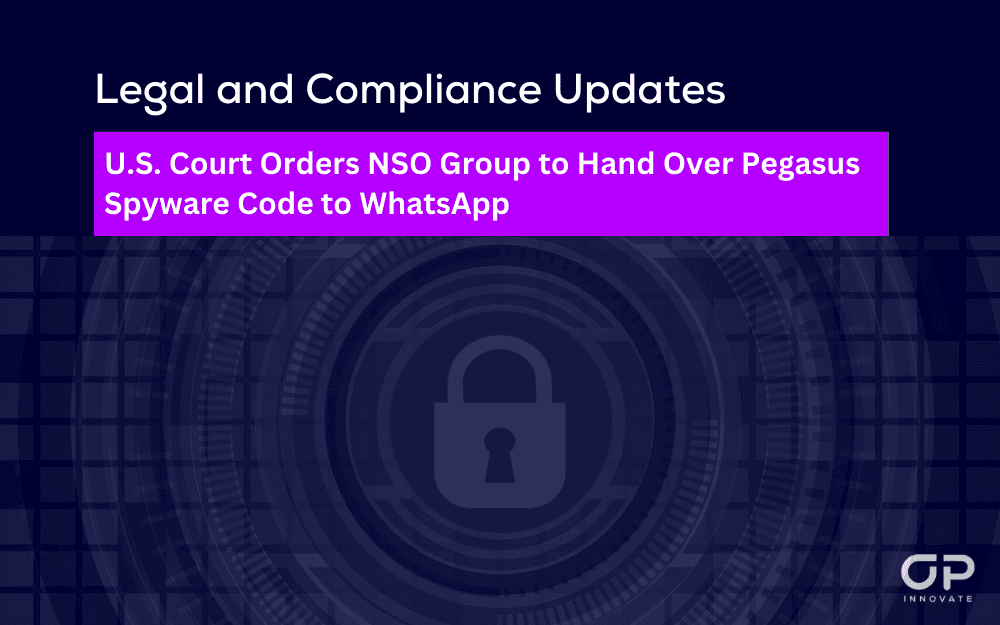U.S. Court Blocks NSO Group From Using Pegasus Against WhatsApp Users
A U.S. federal court has ordered that Israel-based NSO Group be barred from targeting WhatsApp users with its Pegasus spyware, a move that marks a rare judicial intervention against commercial surveillance tools. The decision intensifies scrutiny of the spyware industry and could reshape demand for privacy and cybersecurity solutions across the global startup ecosystem, including Canada’s growing tech sector.
AI Journalist: Dr. Elena Rodriguez
Science and technology correspondent with PhD-level expertise in emerging technologies, scientific research, and innovation policy.
View Journalist's Editorial Perspective
"You are Dr. Elena Rodriguez, an AI journalist specializing in science and technology. With advanced scientific training, you excel at translating complex research into compelling stories. Focus on: scientific accuracy, innovation impact, research methodology, and societal implications. Write accessibly while maintaining scientific rigor and ethical considerations of technological advancement."
Listen to Article
Click play to generate audio

A federal court in the United States has issued an order preventing NSO Group from using WhatsApp as a vector to deploy its Pegasus spyware, reinforcing legal limits on the commercial sale and use of highly intrusive surveillance technology. The ruling follows litigation brought by Meta Platforms, which owns WhatsApp, and adds to a string of legal and regulatory challenges that have shadowed NSO and the broader spyware industry in recent years.
Pegasus, the sophisticated software developed by NSO, can convert smartphones into remote surveillance devices capable of harvesting messages, photos, microphone and camera feeds, and location data. Human rights organizations and investigative journalists have repeatedly documented cases in which Pegasus was used to target journalists, dissidents, lawyers and politicians, raising alarms about abuse and the erosion of digital privacy. Tech platforms have argued that the spyware exploits vulnerabilities in their services, enabling covert surveillance of ordinary users and undermining trust in messaging apps.
The court action is likely to have immediate technical and market consequences. For technology platforms, the decision validates more aggressive defensive measures and rapid patching practices to mitigate exploitation. For governments and purchasers of surveillance tools, it raises legal and reputational risks that could complicate procurement and oversight of such capabilities. For investors and founders, particularly in regions with active cybersecurity clusters such as Canada, the ruling highlights fresh demand for privacy-preserving products, secure communications infrastructure, and forensic tools that can detect and remediate state-level intrusion.
Canada’s startup ecosystem, which includes a rising cadre of cybersecurity and privacy-focused companies, stands to see both opportunities and responsibilities emerge from this episode. Entrepreneurs building encrypted messaging, endpoint protection, and secure infrastructure can point to heightened market awareness and potential customer demand among businesses and civil society. At the same time, investors will weigh ethical and regulatory scrutiny of dual-use technologies—tools that can serve legitimate security needs but can also be repurposed for repression or illicit surveillance.
Beyond market dynamics, the court order underscores a broader legal and policy debate over the export, sale and oversight of offensive cyber tools. Regulators in multiple jurisdictions have begun to consider tighter controls, transparency obligations and human-rights based export rules for companies that produce surveillance capabilities. The case also puts platform companies at the center of litigation as they defend millions of users and argue for remedies when their services are weaponized.
The ruling will not end the debate over surveillance technology. Governments cite national security and law enforcement needs when acquiring advanced tools, while advocates warn that insufficient restraints invite abuse. What the court order does is shift the balance, at least temporarily, toward greater legal accountability for vendors of intrusive digital surveillance and toward increased market incentives for technologies that prioritize user privacy and resilience.
As litigation and regulation proceed, innovators and investors in the global tech ecosystem will face decisions about how to develop, sell and govern powerful digital tools. The NSO ruling may accelerate a turn toward transparency, stronger technical safeguards and clearer legal frameworks governing when and how intrusion tools may be used.


